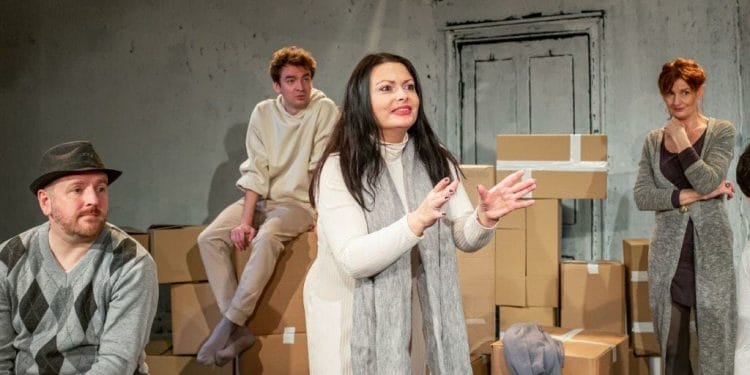 Rosalind Blessed’s Lullabies for the Lost comes to The Old Red Lion Theatre as part of a double bill of Blessed’s work. It is performed on alternate nights with The Delights of Dogs and the Problems with People, and both these pieces share common themes of mental health issues, and dealing with the consequences of living with various conditions.
Rosalind Blessed’s Lullabies for the Lost comes to The Old Red Lion Theatre as part of a double bill of Blessed’s work. It is performed on alternate nights with The Delights of Dogs and the Problems with People, and both these pieces share common themes of mental health issues, and dealing with the consequences of living with various conditions.
In Lullabies for the Lost, we find ourselves in some kind of purgatory, a white room filled with white cardboard boxes and a group of people who are forced to present their inner demons over and over until they can finally recognise what needs to change. On doing so, the door opens, freeing them, but leaving the others behind to resume the cycle.
It begins with Larry (Chris Porter), dealing with depression, finding his way in to the room and asking questions about what this place actually is. Like the audience, Larry doesn’t get the answers he seeks and we are left to draw our own conclusions to what the multitude of metaphors could mean.
So, the bulk of the play is formed of monologues, while each one is distinctly different, they all nicely lead in to the next, and Rosalind Blessed’s writing is strongest where we see these links come to fruition. Andy’s (Chris Pybus) features a rescue dog, another theme which links both plays together. Helen Bang as Sarah and Kate Tydman as Nerys both give emotionally charged performances that leave the audience reeling, while Nick Murphey and Liam Mulvey, as brothers Jez and Tim, demonstrate how easily these problems appear to be solvable to an outsider, but impossible to overcome for the individuals in question.
Rosalind Blessed’s own monologue is particularly affecting, and there appears to be a ring of the autobiographical to it all. Hers, along with Duncan Wilkins, deal with eating disorders and are graphic and painful, offering an undiluted peek in to these devastating disorders.
The monologues themselves are powerful and rich with detail, but the wider narrative lacks any real direction. The ending, again a metaphor in itself, feels frustratingly easy and doesn’t do anything to complement that overarching story, but somehow manages to cheapen it.
Lullabies for the Lost therefore feels like two plays on its own. One that lacks detail and purpose, and another that overcompensates with powerfully told stories filled to the brim with evocative detail.






















